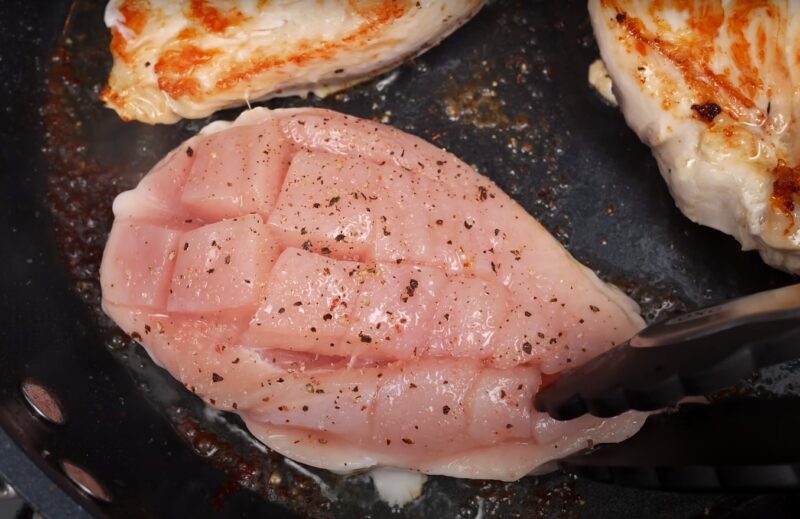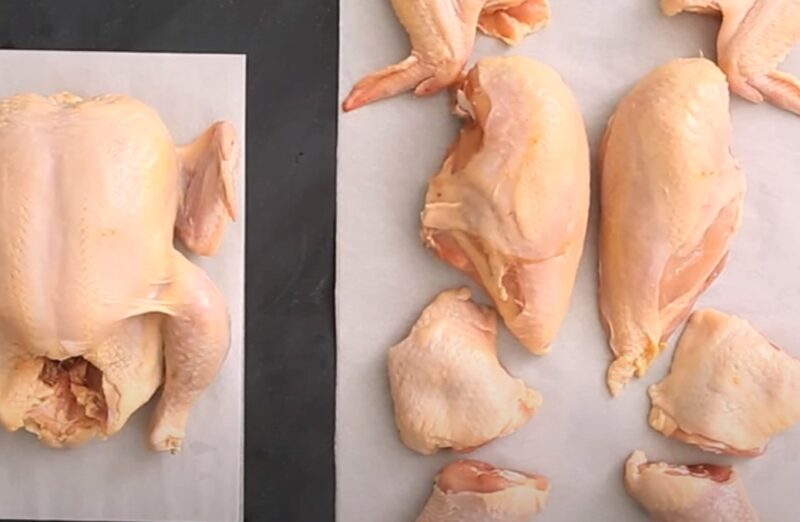Broiler chicken, a staple in many diets across the globe, is more than just a source of protein. It’s a nutritional powerhouse packed with a variety of essential nutrients. This blog post delves into the nutrient profile of broiler chicken, shedding light on its myriad health benefits and its role in a balanced diet.
Nutritional Content
Protein: The Building Block

- Quantity: 28.04 grams per 100 grams
- Benefits: Essential for muscle building and repair, immune function, and maintaining lean body mass.
Protein is the standout nutrient in broiler chicken, making it a favorite among athletes, bodybuilders, and health-conscious individuals. The high-quality protein found in chicken is complete, meaning it contains all nine essential amino acids necessary for human health.
Fats: The Good and the Bad
- Quantity: 3.57 grams per 100 grams
- Types of Fats: Predominantly unsaturated fats, with a small amount of saturated fat.
- Cholesterol: 86 mg per 100 grams
While broiler chicken does contain some fat, it’s important to note that not all fats are created equal. The majority of the fat in chicken is unsaturated, which is beneficial for heart health. However, it also contains cholesterol, necessitating moderation in consumption, especially for those with cardiovascular concerns.
Choosing Healthy Fats
- Recommendation: Opt for lean cuts and remove the skin to reduce saturated fat intake.
- Healthy Alternatives: Complement chicken with sources of unsaturated fats like vegetable oils, nuts, and seeds.
Carbohydrates, Sugars, and Fiber

- Content: Broiler chicken is free of carbohydrates, sugars, and dietary fiber.
This makes it an excellent choice for low-carb and ketogenic diets, focusing on reducing carbohydrate intake for various health benefits.
Sodium: A Double-Edged Sword
- Quantity: 328 milligrams per 100 grams
- Daily Value: 22% of total daily needs
Sodium is essential for fluid balance and nerve function, but excessive intake can lead to hypertension and cardiovascular issues. Broiler chicken’s sodium content warrants mindful consumption, especially for those with high blood pressure.
Water Content: Hydration and Weight
- Quantity: 67.78 grams per 100 grams
- Importance: High water content makes broiler chicken a filling, yet low-calorie option.
Micronutrients in Broiler Chicken

Vitamins: Small but Mighty
- Vitamin A: 17 IU
- Vitamin B-9 (Folate): 11 mg
- Vitamin B-3 (Niacin): 9.63 mg
These vitamins play vital roles in vision, DNA synthesis, and energy metabolism. Vitamin B-3, in particular, is crucial for converting food into energy.
Minerals: Beyond the Basics
- Sodium: 328 mg
- Potassium: 284 mg
- Phosphorus: 246 mg
While broiler chicken lacks manganese and fluoride, it is rich in other minerals. Potassium is key for heart health and muscle function, while phosphorus is important for strong bones and teeth.
Incorporating Broiler Chicken into Your Diet

Portion Control and Preparation
- Serving Size: Aim for 3-4 ounces (85-113 grams) per serving.
- Cooking Methods: Opt for grilling, baking, or steaming over frying to maintain the nutritional integrity.
Dietary Considerations
- For Weight Management: Lean chicken is a great option due to its high protein and low fat content.
- For Heart Health: Monitor portion sizes and preparation methods to manage fat and cholesterol intake.
Complementary Foods
- Vegetables and Grains: Pair chicken with whole grains and a variety of vegetables for a balanced meal.
- Legumes and Nuts: Incorporate these for additional protein and healthy fats.
Culinary Uses and Healthy Recipes
Recipe 1: Grilled Chicken Salad
Ingredients:
- 2 boneless, skinless broiler chicken breasts
- Mixed greens (lettuce, spinach, arugula)
- Cherry tomatoes, halved
- Cucumber, sliced
- Red onion, thinly sliced
- Olive oil, lemon juice, salt, and pepper for dressing
Preparation:
- Season the chicken breasts with salt, pepper, and a touch of olive oil.
- Grill the chicken until thoroughly cooked and juicy.
- Slice the grilled chicken and arrange it over a bed of mixed greens, cherry tomatoes, cucumber, and red onion.
- Drizzle with a simple dressing of olive oil, lemon juice, salt, and pepper.
This recipe is a perfect blend of high-quality protein from the chicken and the nutrients of fresh vegetables, making it an ideal meal for weight management and overall health.
Recipe 2: Chicken and Vegetable Stir-Fry
Ingredients:
- 200 grams of broiler chicken, cut into strips
- Bell peppers, sliced
- Broccoli florets
- Carrot, thinly sliced
- Garlic and ginger, minced
- Soy sauce, sesame oil, and a touch of honey
Preparation:
- Heat a wok or large frying pan and add a small amount of sesame oil.
- Sauté the garlic and ginger until fragrant.
- Add the chicken strips and cook until browned.
- Add the vegetables and stir-fry until just tender.
- Finish with a splash of soy sauce and a touch of honey for flavor.
This stir-fry is not only quick and easy but also packs a nutritional punch with a variety of vegetables and lean protein.
Recipe 3: Baked Chicken with Herbs
Ingredients:
- 4 broiler chicken thighs
- Rosemary, thyme, and parsley, finely chopped
- Garlic, minced
- Olive oil, salt, and pepper
Preparation:
- Preheat the oven to 375°F (190°C).
- Rub the chicken thighs with olive oil, garlic, and herbs. Season with salt and pepper.
- Place in a baking dish and bake for about 35-40 minutes until the chicken is cooked through and the skin is crispy.
This baked chicken dish is a flavorful way to enjoy the benefits of broiler chicken, with the added aromatic flavors of herbs enhancing its taste and nutritional value.
Pairing with Sides for a Balanced Meal
To create a well-rounded meal, pair these chicken dishes with whole grains like quinoa, brown rice, or whole-grain pasta. Adding a side of steamed, roasted, or raw vegetables can provide additional vitamins, minerals, and fiber.
FAQ
Is broiler chicken a good source of Omega-3 fatty acids?
Broiler chicken contains a small amount of Omega-3 fatty acids, but it is not as high as in fatty fish like salmon. Including a variety of protein sources in your diet can ensure adequate Omega-3 intake.
Can eating broiler chicken help in weight loss?
Yes, broiler chicken, particularly lean cuts like breast meat, can be beneficial for weight loss due to its high protein content and low fat and carbohydrate content.
Are there any concerns about hormones in broiler chicken?
Regulations vary by country, but in many places, the use of hormones in poultry farming is prohibited. Always check local regulations and opt for organic or certified hormone-free chicken if possible.
How does the cooking method affect the nutrient content of broiler chicken?
Cooking methods like grilling, baking, and steaming preserve most nutrients. However, frying or cooking in heavy sauces can add extra calories and decrease its nutritional value.
Is broiler chicken suitable for a low-sodium diet?
Broiler chicken naturally contains sodium, so for a low-sodium diet, it’s important to monitor portion sizes and avoid additional salt during cooking.
What is the best way to store broiler chicken?
Store raw chicken in the refrigerator for up to two days and in the freezer for longer periods. Cooked chicken can be refrigerated for about three to four days.
Conclusion
Broiler chicken is not just a protein-rich food; it’s a complex nutrient source that can play a significant role in a healthy, balanced diet. Understanding its nutrient profile helps in making informed dietary choices, contributing to overall health and well-being. As with any food, moderation and mindful preparation are key to maximizing the benefits of broiler chicken.
